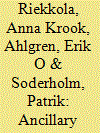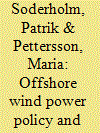|
|
|
Sort Order |
|
|
|
Items / Page
|
|
|
|
|
|
|
| Srl | Item |
| 1 |
ID:
109352


|
|
|
|
|
| Publication |
2011.
|
| Summary/Abstract |
It is increasingly recognised that GHG reduction policies can have important ancillary benefits in the form of positive local and regional environmental impacts. The purpose of this paper is to estimate the domestic ancillary pollution benefits of climate policy in Sweden, and investigate how these are affected by different climate policy designs. The latter differ primarily in terms of how the country chooses to meet a specific target and where the necessary emission reductions take place. The analysis relies on simulations within the energy system optimisation model TIMES-Sweden, and focuses on four non-GHG pollutants: Nitrogen Oxides (NOX), Non Methane Volatile Organic Compounds (NMVOC), inhalable particles (PM2.5), and Sulphur dioxide (SO2). The simulations permit detailed assessments of the respective technology and fuel choices that underlie any net changes in the estimated ancillary effects. The results indicate that the ancillary benefits constitute a far from insignificant share of total system costs, and this share appears to be highest in the scenarios that entail the largest emission reductions domestically. This result reflects the fact that carbon dioxide emission reductions abroad also implies a lost opportunity of achieving substantial domestic welfare gain from the reductions of regional and local environmental pollutants.
|
|
|
|
|
|
|
|
|
|
|
|
|
|
|
|
| 2 |
ID:
094305


|
|
|
|
|
| Publication |
2010.
|
| Summary/Abstract |
The purpose of this paper is to analyze Swedish households' willingness to increase their daily efforts to save electricity. The analysis builds on a broad theoretical framework, which embraces both economic and norm-based motivations in explaining household behavior. The paper pays particular attention to the role of information about the availability of different behavioral changes that can be undertaken at the household level. The empirical results are based on a postal survey that was sent out to 1200 Swedish households, and the econometric analysis is carried out within a so-called ordered probit framework. Our results indicate that costs, environmental attitudes and social interactions are all important determinants of electricity saving activities within Swedish households. We tested the hypothesis that information about available savings measures that is presented in a more concrete and specific way is more likely to affect (stated) behavior than is more general information, and the data collected support this notion. The paper ends by discussing some implications of these results for the design of future informative policy measures in the energy-efficiency field.
|
|
|
|
|
|
|
|
|
|
|
|
|
|
|
|
| 3 |
ID:
114327


|
|
|
|
|
| Publication |
2012.
|
| Summary/Abstract |
The objective of this paper is to analyze electricity demand behaviour in the Swedish pulp and paper industry in the context of the increased interest in so-called voluntary energy efficiency programs. In these programs tax exemptions are granted if the participating firms carry out energy efficiency measures following an energy audit. We employ a panel data set of 19 pulp and paper firms, and estimate both the own- and cross-price elasticities of electricity demand as well as the impact of knowledge accumulation following private R&D on electricity use. The empirical results show that electricity use in the Swedish pulp and paper industry is relatively own-price insensitive, and the self-reported electricity savings following the voluntary so-called PFE program support the notion of important information asymmetries at the company level. However, the results display that already in a baseline setting pulp and paper firms tend to invest in private R&D that have electricity saving impacts, and our model simulations suggest that up to about one-third of the industry sector's self-reported electricity savings in PFE could be attributable to pure baseline effects. Future evaluations of voluntary energy efficiency programs must increasingly recognize the already existing incentives to reduce energy use in energy-intensive industries.
|
|
|
|
|
|
|
|
|
|
|
|
|
|
|
|
| 4 |
ID:
091695


|
|
|
|
|
| Publication |
2009.
|
| Summary/Abstract |
Efficient power plant licensing procedures are essential for the functioning of deregulated electricity markets. The purpose of this paper is to review and analyse the licensing process for nuclear power plants in Sweden, and in part contrast the Swedish case with the corresponding approaches in a selection of other countries. This approach permits a discussion of how licensing processes can be altered and what the benefits and drawbacks of such changes are. The paper highlights and discusses a number of important legal issues and implications, including, for instance: (a) the role of political versus impartial decision-making bodies; (b) the tension between national policy goals and implementation at the local level; (c) public participation and access to justice; (d) consistency and clarity of the legal system; and (e) the introduction of license time limits.
|
|
|
|
|
|
|
|
|
|
|
|
|
|
|
|
| 5 |
ID:
103596


|
|
|
|
|
| Publication |
2011.
|
| Summary/Abstract |
The main objective of this paper is to analyze the role of policy support schemes and planning systems for inducing offshore wind power development in Sweden. Specifically, it highlights the different types of economic, political and planning-related conditions that face offshore wind power investors in Sweden, and provides brief comparisons to the corresponding investment conditions in Denmark, Norway and the UK. The analysis shows that in Sweden existing policy incentives are generally too weak to promote a significant development of offshore wind power, and the paper provides a discussion about a number of political and economic aspects on the choice between different support schemes for offshore wind in the country. Swedish permitting and planning procedures, though, appear favorable to such a development, not the least in comparison to the corresponding processes in the other major offshore wind countries in Europe (e.g., the UK). On a general level the paper illustrates that the success and failure stories of national offshore wind policies and institutions cannot be easily transferred across country borders, and the analysis shows that both the political and the legal frameworks governing the investment situation for offshore wind farms in Denmark, Norway, Sweden and the UK differ significantly.
|
|
|
|
|
|
|
|
|
|
|
|
|
|
|
|
|
|
|
|
|